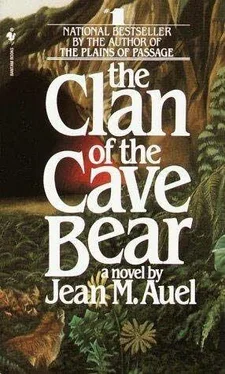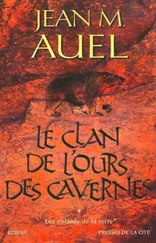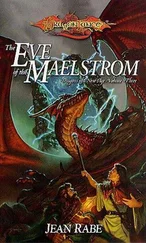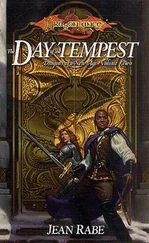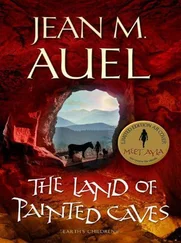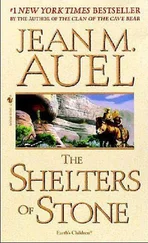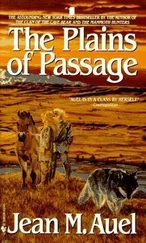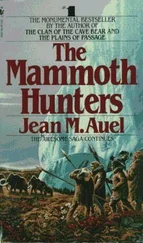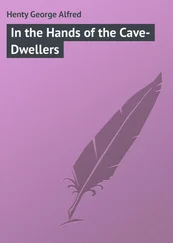There was Droog; since Goov’s mother had been killed in the earthquake, he was alone now. Iza respected Droog. He was the best maker of tools in the clan. Any of them could chip flakes from a flint boulder to make a rough hand-axe or scraper, but Droog had a real talent for it. He could preshape the stone so that the flakes he knapped off would have the size and shape he wanted. His knives, scrapers, all his tools, were highly prized. If the choice were hers, of all the men in the clan, Iza would choose Droog. He had been good to the acolyte’s mother. There had been a genuine fondness in their relationship.
It was more likely, though, Iza knew, that Aga would be given to him. Aga was younger, and already the mother of two children. Her son, Vorn, would soon need a hunter to be responsible for his training, and the baby, Ona, needed a man to provide for her until she grew up and mated herself. The toolmaker would probably be willing to take her mother, Aba, too. The old woman needed a place as well as her daughter. Taking on all those responsibilities would make quite a change in the life of the quiet, orderly toolmaker. Aga could be a little difficult at times, and she didn’t have the understanding Goov’s mother had had, but Goov would be setting up his own hearth soon, and Droog needed a woman.
Goov as a mate for her was entirely out of the question. He was too young, just barely a man, and hadn’t even mated for the first time. Brun would never give him an old woman, and Iza would feel more like his mother than his mate.
Iza had thought about living with Grod and Uka, and the man who had been mated to Grod’s mother, Zoug. Grod was a stiff, laconic man, but never cruel, and his loyalty to Brun was beyond question. She wouldn’t have minded living with Grod, even though she’d be second woman. But Uka was Ebra’s sister and had never quite forgiven Iza her status that had usurped her sibling’s place. And since the death of her son-when he had not yet even moved to his own hearth-Uka was grieving and withdrawn. Not even Ovra, her daughter, was able to soften the woman’s pain. There is too much unhappiness at that hearth, Iza had thought.
She had hardly considered Crug’s fire. Ika, his mate and the mother of Borg, was an open, friendly young woman. That was just the trouble, they were both so young, and Iza had never gotten along very well with Dorv, the old man who had been the mate of Ika’s mother, who shared their fire.
That left Brun, and she could not even be second woman at his hearth; he was her sibling. Not that it mattered, she had her own status. At least she wasn’t like the poor old woman who had finally found her way to the world of the spirits during the earthquake. She had come from another clan, her mate had died long before, she never had any children, and had been traded off from fire to fire, always a burden; a woman with no status, no value.
But the possibility of sharing a hearth with Creb, of his providing for her hadn’t even entered her mind. There was no one in the clan of whom she was fonder, man or woman. He even likes Ayla, she thought, I’m sure of it. It’s a perfect arrangement- unless I have a boy. A boy needs to live with a man who can train him to be a hunter, and Creb can’t hunt.
I could take the medicine to make me lose it, she thought for a moment. Then I could be sure I wouldn’t have a boy. She patted her stomach and shook her head. No, it’s too late, there could be problems. She realized she wanted the baby, and despite her age, her pregnancy had progressed without difficulty. The chances were good that the child would be normal and healthy, and children were too precious to give up lightly. I will ask my totem again to make the baby a girl. He knows I’ve wanted a girl all along. I promised I’d take care of myself so the baby he allowed to start would be healthy, if only he’d make it a girl.
Iza knew women of her years could have problems, and she ate foods and medicines that were helpful to pregnant women. Though never a mother, the medicine woman knew more about pregnancy, delivery, and nursing than most women. She had helped deliver all the youngsters in the clan and she dispensed her knowledge with her medication freely to the women. But there was some magic, passed down from mother to daughter, that was so secret, Iza would have died before revealing it, especially to a man. Any man who found out about it would never permit its use.
The secret had been kept only because no one, man or woman, asked a medicine woman about her magic. The custom of avoiding direct queries was so long-standing, it had become tradition, almost law. She could share her knowledge if someone indicated an interest, but Iza never discussed her special magic because if a man had thought to ask, she could not have refused to answer-no woman could refuse to answer a man-and it was impossible for people of the Clan to lie. Their form of communication, dependent for subtle nuance on barely perceptible changes in expressions, gestures, and postures, made any attempt immediately detectable. They didn’t even have a concept for it; the closest they could come to untruth was to refrain from speaking, and that was usually discerned, though often allowed.
Iza never mentioned the magic she had learned from her mother, but she had been using it. The magic prevented conception, prevented the spirit of a man’s totem from entering her mouth to start a child. It never occurred to the man who had been her mate to ask her why she had not conceived a child. He assumed her totem was too strong for a woman. He often told her so and bemoaned the fact to the other men as the reason his totem’s essence was not able to overcome hers. Iza used the plants to prevent conception because she wanted to shame her mate. She wanted the clan, and him, to think the impregnating element of his totem was too weak to break down the defenses of hers, even though he beat her.
The beatings were given, supposedly, to force her totem into submission, but Iza knew he enjoyed it. At first, she hoped her mate would give her to some other man if she produced no children. She hated the strutting braggart even before she was given to him, and when she found out who her mate was to be, she could do nothing but cling to her mother in desperation. Her mother could offer only consolation; she had no more say in the matter than her daughter. But her mate did not give her away. Iza was medicine woman, the highest-ranked woman in the Clan, and it gave him a feeling of manliness to have control over her. When the strength of his totem, and his manhood, was in question because his mate produced no offspring, the physical power he had over her compensated for it.
Though the beatings were allowed in the hope that they would result in a child, Iza sensed that Brun disapproved. She was sure if Brun had been leader at the time, she would not have been given to that particular man. A man did not prove his manhood, in Brun’s opinion, by overcoming women. Women had no alternative but to submit. It was unworthy of a man to pit himself against a lesser adversary or to allow his emotions to be provoked by a woman. It was a man’s duty to command women, to maintain discipline, to hunt and provide, to control his emotions, and to show no sign of pain when he was suffering. A woman might be cuffed if she was lazy or disrespectful, but not in anger and not with joy, only to discipline. Though some men struck women more often than others, few men made a habit of it. Only Iza’s mate had made it a regular practice.
After Creb joined their fire, her mate was even more reluctant to give her away. Iza was not only medicine woman, she was the woman who cooked for Mog-ur. If Iza left his fire, Mog-ur would too. Her mate had imagined that the rest of the clan thought he was learning secrets from the great magician. In truth, Creb was never more than properly polite in all the time they shared the same hearth and hardly deigned to notice the man on many occasions. Especially, Iza was sure, when Creb noticed a particularly colorful bruise.
Читать дальше
